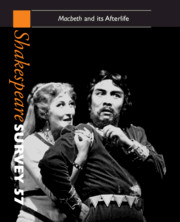Book contents
- Frontmatter
- Humane Statute and the Gentle Weal: Historical Reading and Historical Allegory
- Macbeth’s Knowledge
- ‘The Grace of Grace’ and Double-Talk in Macbeth
- Remind Me: How Many Children Had Lady Macbeth?
- Taking Macbeth out of Himself: Davenant, Garrick, Schiller and Verdi
- ‘Two truths are told’: Afterlives and Histories of Macbeths
- Doing All That Becomes a Man: The Reception and Afterlife of the Macbeth Actor, 1744–1889
- Macbeth and Kierkegaard
- Monsieur Macbeth: from Jarry to Ionesco
- The Politics of Sleepwalking: American Lady Macbeths
- Macbird! and Macbeth: Topicality and Imitation in Barbara Garson’s Satirical Pastiche
- Mick Jagger Macbeth
- ‘The Zulu Macbeth’: The Value of an ‘African Shakespeare’
- ‘A Drum, a Drum – Macbeth doth come’: When Birnam Wood moved to China
- The Banquet of Scotland (PA)
- Scoff power in Love’s Labour’s Lost and the Inns of Court: Language in Context
- Mercury, Boy Yet and the ‘Harsh’ Words of Love’s Labour’s Lost
- Shakespeare, Sir Thomas More and Asylum Seekers
- Hal as Self-Styled Redeemer: The Harrowing of Hell and Henry IV Part 1
- Mr Hamlet of Broadway
- Shakespeare Performances in England, 2003
- Professional Shakespeare Productions in the British Isles January–December 2002
- The Year's Contributions to Shakespearian Study 1 Critical Studies
- 2 Shakespeare in Performance
- 3 Editions and Textual Studies
- Books Received
- Index
Taking Macbeth out of Himself: Davenant, Garrick, Schiller and Verdi
Published online by Cambridge University Press: 28 March 2007
- Frontmatter
- Humane Statute and the Gentle Weal: Historical Reading and Historical Allegory
- Macbeth’s Knowledge
- ‘The Grace of Grace’ and Double-Talk in Macbeth
- Remind Me: How Many Children Had Lady Macbeth?
- Taking Macbeth out of Himself: Davenant, Garrick, Schiller and Verdi
- ‘Two truths are told’: Afterlives and Histories of Macbeths
- Doing All That Becomes a Man: The Reception and Afterlife of the Macbeth Actor, 1744–1889
- Macbeth and Kierkegaard
- Monsieur Macbeth: from Jarry to Ionesco
- The Politics of Sleepwalking: American Lady Macbeths
- Macbird! and Macbeth: Topicality and Imitation in Barbara Garson’s Satirical Pastiche
- Mick Jagger Macbeth
- ‘The Zulu Macbeth’: The Value of an ‘African Shakespeare’
- ‘A Drum, a Drum – Macbeth doth come’: When Birnam Wood moved to China
- The Banquet of Scotland (PA)
- Scoff power in Love’s Labour’s Lost and the Inns of Court: Language in Context
- Mercury, Boy Yet and the ‘Harsh’ Words of Love’s Labour’s Lost
- Shakespeare, Sir Thomas More and Asylum Seekers
- Hal as Self-Styled Redeemer: The Harrowing of Hell and Henry IV Part 1
- Mr Hamlet of Broadway
- Shakespeare Performances in England, 2003
- Professional Shakespeare Productions in the British Isles January–December 2002
- The Year's Contributions to Shakespearian Study 1 Critical Studies
- 2 Shakespeare in Performance
- 3 Editions and Textual Studies
- Books Received
- Index
Summary
Macbeth, it is widely recognized, has a dynamic unique among Shakespeare’s tragedies. By-and-large we accept the premise that dramatic action on Shakespeare’s stage serves as a surrogate for or a reflection of life in the world outside the theatre. Hamlet lives in the concrete reality of Elsinore and while his father’s ghost may trouble his confidence in the reliability of his perceptions, we as his audience remain fairly confident that the world in which he lives can be understood as having a materiality equivalent to the physical surroundings in which we ourselves live. The same is true with Othello. Othello, with Iago’s help, fills himself with the delusion of Desdemona’s infidelity and comes to see the world through the grotesque forms and lurid colors of nightmare, but we as audience do not. In fact, the primary tension of the play lies between the world as Othello sees it through his inflamed imagination and our recognition that in actuality it is different from his vision of it. But in Macbeth our vision is as clouded, as coloured, and as mystified as that of Macbeth himself. He sees the world through his accumulating guilt and the terrible fears generated by his imagination; it is frightening, full of menace and we see it as he does. The main conflict is within him and not, as in Othello, between the hero and phenomenal reality. Because of this, Macbeth dominates the action of his play like no other Shakespearian hero does. In the other tragedies, not only is the ‘real world’ separate from the hero, it is also a region into which we can imaginatively retreat when we are overwhelmed by the intensity of the hero’s tragic fate and from which we can observe him. In Macbeth, however, even when the ‘real world’ is made available to us, when the action, for example, moves to Macduff’s castle or the English court, Macbeth is still the dominant presence onstage, because as the fate of every character is determined by him, they are entirely preoccupied with him. We can escape neither him nor the world he has made.
- Type
- Chapter
- Information
- Shakespeare SurveyAn Annual Survey of Shakespeare Studies and Production, pp. 54 - 68Publisher: Cambridge University PressPrint publication year: 2004

